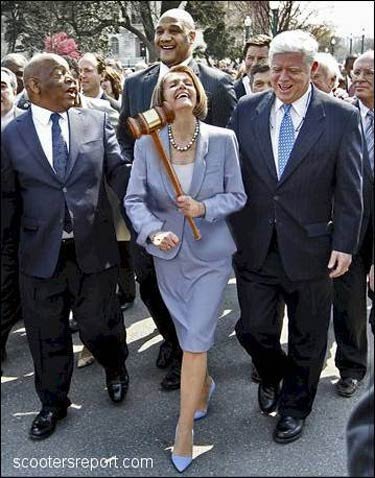Category Archive 'Obamacare'
29 Nov 2013


King Prawn, at Ricochet, identifies by metaphor the key distinguishing characteristics of The Public Good.
Whether you work in an office, a shop, or a store, you’ve had this experience. Every break room, lunch room, and food mess has one: the community fridge. The chair I occupied in the lunch room today was right next to one of these things, and every time the door was opened I was reminded of what a perfect metaphor it is for any contrived public good. Let’s review a few of the similarities:
Everyone uses it whether they like it or not
No one takes responsibility for its upkeep
Everyone claims a disproportionate amount of the good
Individuality and property rights disappear within it (I ate a sandwich named Steve…)
Unwanted personal items are often abandoned here
Over time, the condition deteriorates to a completely unsanitary state
Everyone complains about the conditions
Everyone expects someone else to deal with the problem
Eventually those who use it the least end up cleaning the thing out
The smell never completely goes away
In over 20 years of gainful employment, I’ve never seen a common work refrigerator that did not fit this description perfectly. Every experience I have had with a contrived public good has been exactly the same — be it public transportation, public restrooms, or public recreational facilities. We can now expect the same in our healthcare.
21 Nov 2013


Clay Shirky describes how government IT cannot effectively translate planning into reality, avoids testing, and insists on shunning a phased roll-out approach but then finds itself experiencing exactly that.
It’s certainly true that Federal IT is chronically challenged by its own processes. But the problem with Healthcare.gov was not timeline or budget. The problem was that the site did not work, and the administration decided to launch it anyway.
This is not just a hiring problem, or a procurement problem. This is a management problem, and a cultural problem. The preferred method for implementing large technology projects in Washington is to write the plans up front, break them into increasingly detailed specifications, then build what the specifications call for. It’s often called the waterfall method, because on a timeline the project cascades from planning, at the top left of the chart, down to implementation, on the bottom right.
Like all organizational models, waterfall is mainly a theory of collaboration. By putting the most serious planning at the beginning, with subsequent work derived from the plan, the waterfall method amounts to a pledge by all parties not to learn anything while doing the actual work. Instead, waterfall insists that the participants will understand best how things should work before accumulating any real-world experience, and that planners will always know more than workers.
This is a perfect fit for a culture that communicates in the deontic language of legislation. It is also a dreadful way to make new technology. If there is no room for learning by doing, early mistakes will resist correction. If the people with real technical knowledge can’t deliver bad news up the chain, potential failures get embedded rather than uprooted as the work goes on. …
[Emphasis added:] The vision of “technology†as something you can buy according to a plan, then have delivered as if it were coming off a truck, flatters and relieves managers who have no idea and no interest in how this stuff works, but it’s also a breeding ground for disaster. The mismatch between technical competence and executive authority is at least as bad in government now as it was in media companies in the 1990s, but with much more at stake.
Read the whole thing.
Hat tip to the Dish.
17 Nov 2013


Law Professor Jonathan H. Adler, who posts at Volokh, is just not as intelligent as Barack Obama. Consequently, he cannot understand how the president simply waving his hand at a press conference, and announcing that he does not intend to enforce his own federal law can practically serve as a solution which will preserve insurance policies cancelled as a result of the Obamacare law. You have to be as intelligent as Barack Obama to understand the operation of the dialectic in the interaction between these things.
Yesterday, the President announced a purported fix to the problem that, under the PPACA [aka Obamacare], insurance companies are not allowed to renew policies that fail to comply with PPACA requirements, even if consumers like their existing plans. …
According to the President’s announcement, insurance companies will be allowed to renew policies that were in force as of October 1, 2013 for one additional year, even if they fail to meet relevant PPACA requirements. What is the legal basis for this change? The Administration has not cited any. … According to various press reports, the Administration argues it may do this as a matter of enforcement discretion (much as it did with immigration). In other words, the Administration is not changing the law. It’s just announcing it will not enforce federal law (while simultaneously threatening to veto legislation that would authorize the step the President has decided to take).
Does this make the renewal of non-compliant policies legal? No. The legal requirement remains on the books so the relevant health insurance plans remain illegal under federal law. The President’s decision does not change relevant state laws either. So insurers will still need to obtain approval from state insurance commissioners. This typically requires submitting rates and plan specifications for approval. This can take some time, and is disruptive because most insurance companies have already set their offerings for the next year. It’s no wonder that some insurance commissioners have already indicated they have no plans to approve non-compliant plans.
Yet even if state commissioners approve the plans, they will still be illegal under federal law. … Given this fact, why would any insurance company agree to renew such a plan? It’s nice that regulators may forbear enforcing the relevant regulatory requirements, but this is not the only source of potential legal jeopardy. So, for instance, what happens when there’s a legal dispute under one of these policies? Say, for instance, an insurance company denies payment for something that is not covered under the policy but that would have been covered under the PPACA and the insured sues? Would an insurance company really want to have to defend this decision in court? After all, this would place the insurance company in the position of seeking judicial enforcement of an illegal insurance policy. If there’s an answer to this, I haven’t seen it . … It’s almost as if the Administration has not thought this through.
17 Nov 2013


The young Barack Obama, preparing for the presidency.
Mark Steyn looks on in admiration as Barack Obama legislates via press conference pronouncement, then proceeds to analyse the great man’s “So-let-it-be-written-so-let-it-be-done” style of presidential leadership.
On Thursday, [Barack Obama] passed a new law at a press conference. George III never did that. But, having ordered America’s insurance companies to comply with Obamacare, the president announced that he is now ordering them not to comply with Obamacare. The legislative branch (as it’s still quaintly known) passed a law purporting to grandfather your existing health plan. The regulatory bureaucracy then interpreted the law so as to un-grandfather your health plan. So His Most Excellent Majesty has commanded that your health plan be de-un-grandfathered. That seems likely to work. The insurance industry had three years to prepare for the introduction of Obamacare. Now the King has given them six weeks to de-introduce Obamacare.
“I wonder if he has the legal authority to do this,†mused former Vermont governor Howard Dean. But he’s obviously some kind of right-wing wacko. Later that day, anxious to help him out, Congress offered to “pass†a “law†allowing people to keep their health plans. The same president who had unilaterally commanded that people be allowed to keep their health plans indignantly threatened to veto any such law to that effect: It only counts if he does it — geddit? As his court eunuchs at the Associated Press obligingly put it: “Obama Will Allow Old Plans.†It’s Barry’s world; we just live in it.
The reason for the benign Sovereign’s exercise of the Royal Prerogative is that millions of his subjects — or “folks,†as he prefers to call us, no fewer than 27 times during his press conference — have had their lives upended by Obamacare. Your traditional hard-core statist, surveying the mountain of human wreckage he has wrought, usually says, “Well, you can’t make an omelet without breaking a few eggs.†But Obama is the first to order that his omelet be unscrambled and the eggs put back in their original shells. Is this even doable? No. That’s the point. When it doesn’t work, he’ll be able to give another press conference blaming the insurance companies, or the state commissioners, or George W. Bush . . .
The most telling line, the one that encapsulates the gulf between the boundless fantasies of the faculty-lounge utopian and the messiness of reality, was this: “What we’re also discovering is that insurance is complicated to buy.†Gee, thanks for sharing, genius. Maybe you should have thought of that before you governmentalized one-sixth of the economy. …
[A]s historian Michael Beschloss pronounced the day after his election, he’s “probably the smartest guy ever to become president.†Naturally, Obama shares this assessment. As he assured us five years ago, “I know more about policies on any particular issue than my policy directors.†Well, apart from his signature health-care policy. That’s a mystery to him. “I was not informed directly that the website would not be working,†he told us. The buck stops with something called “the executive branch,†which is apparently nothing to do with him. As evidence that he was entirely out of the loop, he offered this:
Had I been I informed, I wouldn’t be going out saying, “Boy, this is going to be great.†You know, I’m accused of a lot of things, but I don’t think I’m stupid enough to go around saying, “This is going to be like shopping on Amazon or Travelocity,†a week before the website opens, if I thought that it wasn’t going to work.
Ooooo-kay. So, if I follow correctly, the smartest president ever is not smart enough to ensure that his website works; he’s not smart enough to inquire of others as to whether his website works; he’s not smart enough to check that his website works before he goes out and tells people what a great website experience they’re in for. But he is smart enough to know that he’s not stupid enough to go around bragging about how well it works if he’d already been informed that it doesn’t work. So he’s smart enough to know that if he’d known what he didn’t know he’d know enough not to let it be known that he knew nothing. The country’s in the very best of hands.
Michael Beschloss is right: This is what it means to be smart in a neo-monarchical America. Obama spake, and it shall be so. And, if it turns out not to be so, why pick on him? He talks a good Royal Proclamation; why get hung up on details?
Until October 1, Obama had never done anything — not run a gas station, or a doughnut stand — other than let himself be wafted onward and upward to the next do-nothing gig. Even in his first term, he didn’t really do: Starting with the 2009 trillion-dollar stimulus, he ran a money-no-object government that was all money and no objects; he spent and spent, and left no trace. Some things he massively expanded (food stamps, Social Security disability) and other things he massively diminished (effective foreign policy), but all were, so to speak, preexisting conditions. Obamacare is the first thing Obama has actually done, and, if you’re the person it’s being done to, it’s not pretty.
The president promised to “fundamentally transform†America. Certainly, other men have succeeded in transforming settled, free societies: Pierre Trudeau did in Canada four decades ago, and so, in post-war Britain, did the less charismatic Clement Attlee. And, if you subscribe to their particular philosophy, their transformations were effected very efficiently. But Obama is an incompetent, so “fundamentally transformed†is a euphemism for “wrecked beyond repair.†As a socialist, he makes a good socialite.
But on he staggers, with a wave of his scepter, delaying this, staying that, exempting the other, according to his regal whim and internal polling. The omniscient beneficent Sovereign will now graciously “allow†us “folks†to keep all those junk plans from bad-apple insurers. Yet even the wisest King cannot reign forever, and what will happen decades down the road were someone less benign — perhaps even (shudder) a Republican — to ascend the throne and wield these mighty powers?
Hey, relax: If you like your constitution, you can keep your constitution. Period. And your existing amendments. Well, most of them — except for the junk ones . . .
16 Nov 2013


Fouad Ajami, in the Wall Street Journal, comments on the recent dissolution of the illusion.
The current troubles of the Obama presidency can be read back into its beginnings. Rule by personal charisma has met its proper fate. The spell has been broken, and the magician stands exposed. We need no pollsters to tell us of the loss of faith in Mr. Obama’s policies—and, more significantly, in the man himself. Charisma is like that. Crowds come together and they project their needs onto an imagined redeemer. The redeemer leaves the crowd to its imagination: For as long as the charismatic moment lasts—a year, an era—the redeemer is above and beyond judgment. He glides through crises, he knits together groups of varied, often clashing, interests. Always there is that magical moment, and its beauty, as a reference point. …
Forgive the personal reference, but from the very beginning of Mr. Obama’s astonishing rise, I felt that I was witnessing something old and familiar. My advantage owed nothing to any mastery of American political history. I was guided by my immersion in the political history of the Arab world and of a life studying Third World societies.
In 2008, seeing the Obama crowds in Portland, Denver and St. Louis spurred memories of the spectacles that had attended the rise and fall of Arab political pretenders. I had lived through the era of the Egyptian leader Gamal Abdul Nasser. He had emerged from a military cabal to become a demigod, immune to judgment. His followers clung to him even as he led the Arabs to a catastrophic military defeat in the Six Day War of 1967. He issued a kind of apology for his performance. But his reign was never about policies and performance. It was about political magic.
In trying to grapple with, and write about, the Obama phenomenon, I found guidance in a book of breathtaking erudition, “Crowds and Power” (1962) by the Nobel laureate Elias Canetti. Born in Bulgaria in 1905 and educated in Vienna and Britain, Canetti was unmatched in his understanding of the passions, and the delusions, of crowds. The crowd is a “mysterious and universal phenomenon,” he writes. It forms where there was nothing before. There comes a moment when “all who belong to the crowd get rid of their difference and feel equal.” Density gives the illusion of equality, a blessed moment when “no one is greater or better than another.” But the crowd also has a presentiment of its own disintegration, a time when those who belong to the crowd “creep back under their private burdens.”
Read the whole thing.
————————
David Boaz adds:
The Day the Magic Died
(Lines inspired by the WSJ headline “When the Obama Magic Died.”)
A long, long time ago
I can still remember how that magic used to make ‘em smile
And I knew if I had my chance
That I could make those people dance
And maybe they’d be happy for a while
But October made me shiver
With every paper they delivered
Bad news on the doorstep
I couldn’t take one more step
I can’t remember if I cried
When the papers said I lied
But something touched me deep inside
The day the magic died
And while I read a book of Marx
The party gathered in the park
And we sang dirges in the dark
The day the magic died
So bye-bye, my Obamacare
Took my browser to the website, but the website was bare
And them good old boys were losin’ all their health care,
Singin’ “This’ll be the way that I die
This’ll be the way that I die”
H/T Don McLean
15 Nov 2013
The Obamacare disaster has commentators this morning casting around for new metaphors. The Titanic, The Hindenburg, the Challenger… have all been used.
So far, Tom Maguire’s commenters are winning by hitting on the image juste for the always-histrionic, but now sooo futile Nancy Pelosi: Norma Desmond from “Sunset Boulevard” (1950).

———————————

Hat tip to Clarice Feldman.
14 Nov 2013


Dan Greenfield deconstructs Barack Obama’s apology to Americans who will lose their health insurance.
Obama’s non-apology apology “I’m sorry that you’re unhappy” is typical of the passive aggressive apology of the twenty-first [century]. What was once character has become branding. What was once manners has become damage control. …
Obama, Hillary and Sebelius all recite formulaic admissions of responsibility without actually taking any. Hillary was happy to take responsibility for Benghazi, as a verbal statement, without actually accepting political or practical responsibility for any of it. Likewise Sebelius and Obama took responsibility for the ObamaCare website without actually accepting it.
Obama took responsibility and then explained that he doesn’t really know anything about programming so he isn’t responsible. …
This is the innocence of incompetence. Obama isn’t a programmer; he can’t be held responsible for Healthcare.gov. Hillary Clinton isn’t a soldier or even a real diplomat. She can’t be held responsible for Benghazi. Sebelius is a political appointee whose job is to look into the camera with the baffled incomprehension of the professional civil servant. “I don’t know anything. I just work here.”
Obama had boasted that he was a better speechwriter than his speechwriters and a better political director than his political directors. But apparently he’s not a better programmer than his programmers.
Programming is hard work compared to finding ways to arrange new promises and lies around “Let me be clear” which is the twenty-first century version of “Read my lips”. It requires knowing how to do something more than blame the previous programmer or the programming language.
The ideologues are always innocent because it’s always the implementation that fails; not their ideas. It’s why Communism isn’t responsible for the USSR or North Korea going down the tubes. The ideas were solid, but the programmers did a bad job of coding their brilliant economic theories into a working website.
And so we are told once again that Obama is smart. Really, really smart. Despite this fearsome intelligence, there isn’t one thing they can point to abroad or at home that he did well on his own. And that very uselessness shows how smart he is. Any idiot can fix a car, build a website or make a foreign policy work. It takes a real genius to come up with the ideas and sigh in disappointment as everyone else screws them up.
Liberal columnists ponder whether Obama is too smart to be president. By that they mean that he’s much too elevated a being to sit around trying to make things work. His proper role would be theorizing how things should work and then putting those theories in book form.
That is something the left is undeniably good at. It’s like an entire movement of flying car inventors who spend so much time describing why flying cars are the answer that they never bother with the question of whether anyone needs flying cars or how to keep flying cars from crashing into things all the time.
Read the whole thing.
13 Nov 2013

Smith & Wesson Model 17
Tyler Durden has the figures.
The preference is pretty understandable. Guns are prettier and they usually actually work.
13 Nov 2013

The Weekly Standard has the story.
/div>

Feeds
|
















